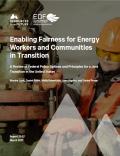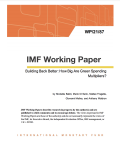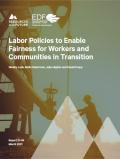South Africa’s government and industry have indicated their intention to position the local value chain as a key player in the mobility of the future. Looking ahead, the possibility of developing the domestic LIB value chain should not be overestimated: South Africa displays key pockets of excellence but not all activities in the value chain are likely viable domestically. At the same time, the importance of developing the LIB value chain should not be underestimated.
This paper provides an empirical analysis of the impact of energy price increases – induced notably by the removal of fossil fuel subsidies – on the joint environmental and economic performance of Indonesian plants in the manufacturing industry for the period 1980-2015.

This paper compiles findings from a series of reports that unpack existing US and European policies related to just transition. To help policymakers identify the components of a comprehensive just transition policy package, more than 100 policies have been grouped into four primary categories.

This working paper estimates multipliers for spending in clean energy and biodiversity conservation to help inform stimulus measures for a post-COVID-19 sustainable recovery.

Workers and communities that are heavily dependent on fossil fuel economies— including the production of coal, oil, and natural gas—are likely to experience disruptions in the status quo as society addresses climate change through the advancement of clean energy alternatives. This report is the fourth in a series that examines policies and programs to promote fairness for workers and communities in a transition to a low–carbon economy, often referred to as a just transition.
